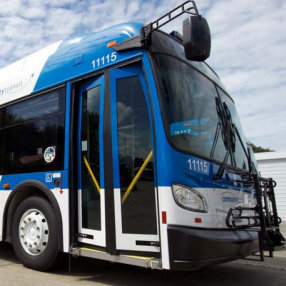
When Community Transit needed to replace 15 older diesel buses at the end of their service life, the transit agency looked to the TIGGER Program to cover the incremental cost — $200,000 per bus — of adding hybrid propulsion systems to the new buses it planned to purchase.
Thanks to $3 million in TIGGER funding, Community Transit will soon operate 15 new 40-ft buses—with hybrid drive systems made by BAE Systems—on local routes with plenty of stop-and-go traffic and limited highway travel. The hybrid’s regenerative braking system is ideally suited for this type of operation, and the new buses are expected to be 30% more fuel efficient than the conventional diesel buses that previously served these routes.
Manufactured by New Flyer Industries, the hybrid buses are powered by an internal combustion clean diesel engine paired with a generator, electric motor, and electric storage system. Lithium-ion batteries provide energy storage to reduce engine demands and enable the use of a smaller engine, which increases fuel efficiency during highway operation as well.
The smaller engine meets new near-zero emissions requirements and offers lower operating and life-cycle costs and improved on-road performance. The hybrid buses also include energy-efficient LED lighting, replacing standard filament and fluorescent lights inside and out. These state-of-the-art buses produce 95% less particulate matter and 30% fewer greenhouse gas emissions than standard diesel buses. In addition to improving air quality and saving energy and money, the hybrid drive system is adaptable to new technology developments that could lead to further emission reductions and fuel savings in the future.The new hybrid buses are also helping Community Transit pave the way for increased demand of this commercially available technology by serving as an example for other transit agencies across the United States.